Toyota Corolla (E210) 2019-2026 Owners Manual / Vehicle specifications / Specifications / Tire information
Toyota Corolla (E210): Tire information
Typical tire symbols
Full-size tire
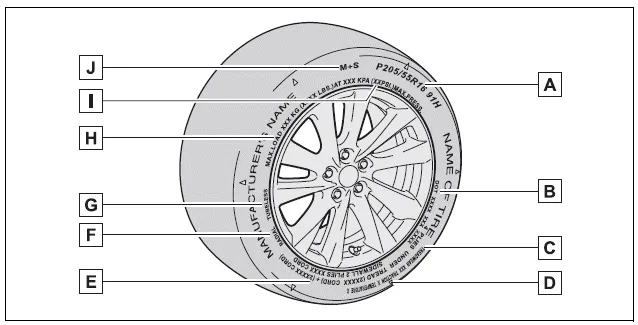
- Tire size
- DOT and Tire Identification Number (TIN)
- Uniform tire quality grading For details, see "Uniform Tire Quality Grading" that follows.
- Location of treadwear indicators
- Tire ply composition and materials Plies are layers of rubber-coated parallel cords. Cords are the strands which form the plies in a tire.
- Radial tires or bias-ply tires A radial tire has "RADIAL" on the sidewall. A tire not marked "RADIAL" is a bias-ply tire.
- TUBELESS or TUBE TYPE A tubeless tire does not have a tube and air is directly put into the tire. A tube type tire has a tube inside the tire and the tube maintains the air pressure.
- Load limit at maximum cold tire inflation pressure
- Maximum cold tire inflation pressure This means the pressure to which a tire may be inflated.
- Summer tires or all season tires
An all season tire has "M+S" on the sidewall. A tire not marked "M+S" is a summer tire.
Compact spare tire
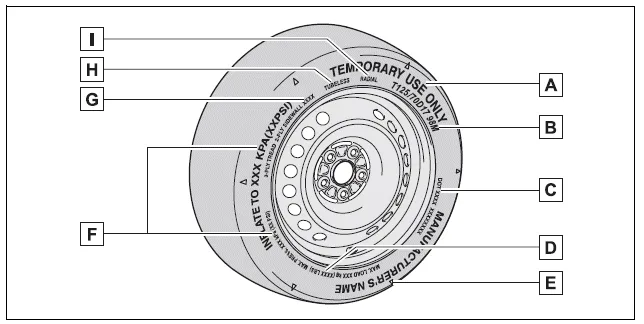
- "TEMPORARY USE ONLY" A compact spare tire is identified by the phrase "TEMPORARY USE ONLY" molded on its sidewall. This tire is designed for temporary emergency use only.
- Tire size
- DOT and Tire Identification Number (TIN)
- Load limit at maximum cold tire inflation pressure
- Location of treadwear indicators
- Maximum cold tire inflation pressure This means the pressure to which a tire may be inflated.
- Tire ply composition and materials Plies are layers of rubber-coated parallel cords. Cords are the strands which form the plies in a tire.
- TUBELESS or TUBE TYPE A tubeless tire does not have a tube and air is directly put into the tire. A tube type tire has a tube inside the tire and the tube maintains the air pressure.
- Radial tires or bias-ply tires A radial tire has "RADIAL" on the sidewall. A tire not marked "RADIAL" is a bias-ply tire.
Typical DOT and Tire Identification Number (TIN)
Type A
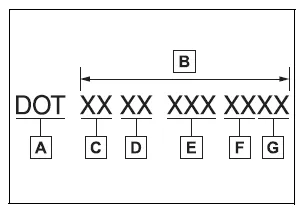
- DOT symbol*
- Tire Identification Number (TIN)
- Tire manufacturer's identification mark
- Tire size code
- Manufacturer's optional tire type code (3 or 4 letters)
- Manufacturing week
- Manufacturing year
*: The DOT symbol certifies that the tire conforms to applicable Federal Motor Vehicle Safety Standards.
Type B
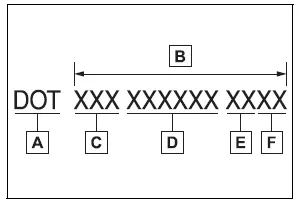
- DOT symbol*
- Tire Identification Number (TIN)
- Tire manufacturer's identification mark
- Manufacturer's code
- Manufacturing week
- Manufacturing year
*: The DOT symbol certifies that the tire conforms to applicable Federal Motor Vehicle Safety Standards.
Tire size
■ Typical tire size information
The illustration indicates typical tire size.
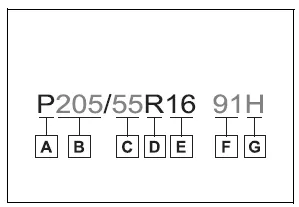
- Tire use (P = Passenger car, T = Temporary use)
- Section width (millimeters)
- Aspect ratio (tire height to section width)
- Tire construction code (R = Radial, D = Diagonal)
- Wheel diameter (inches)
- Load index (2 digits or 3 digits)
- Speed symbol (alphabet with one letter)
■ Tire dimensions
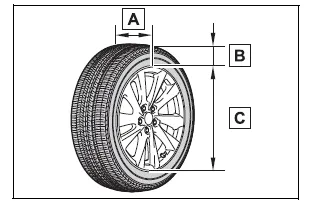
- Section width
- Tire height
- Wheel diameter
Tire section names
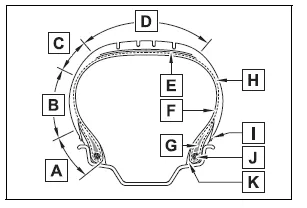
- Bead
- Sidewall
- Shoulder
- Tread
- Belt
- Inner liner
- Reinforcing rubber
- Carcass
- Rim lines
- Bead wires
- Chafer
Other materials:
Circuit description
The fuel trim is related to the feedback compensation value, not to the basic
injection time. The fuel trim includes
the short–term fuel trim and the long–term fuel trim.
The short–term fuel trim is the short–term fuel compensation used to maintain
the air–fuel ratio at stoichiomet ...
Washer fluid
Add washer fluid in the following situations:
● A washer does not work.
● Vehicles without a multi-information display: The low windshield washer fluid
warning light (if equipped) comes on.
● Vehicles with a multi-information display: The warning message (if equipped) appear ...
Child restraint system
fixed with a child restraint
LATCH anchor (except for
Puerto Rico)
■ Child restraint LATCH
anchors
LATCH anchors are provided for
the outboard rear seat. (Marks
displaying the location of the
anchors are attached to the
seats.)
■ When installing in the rear
outboard seats
Install the child restraint system
in accordance to the operation
manual enclosed with th ...


